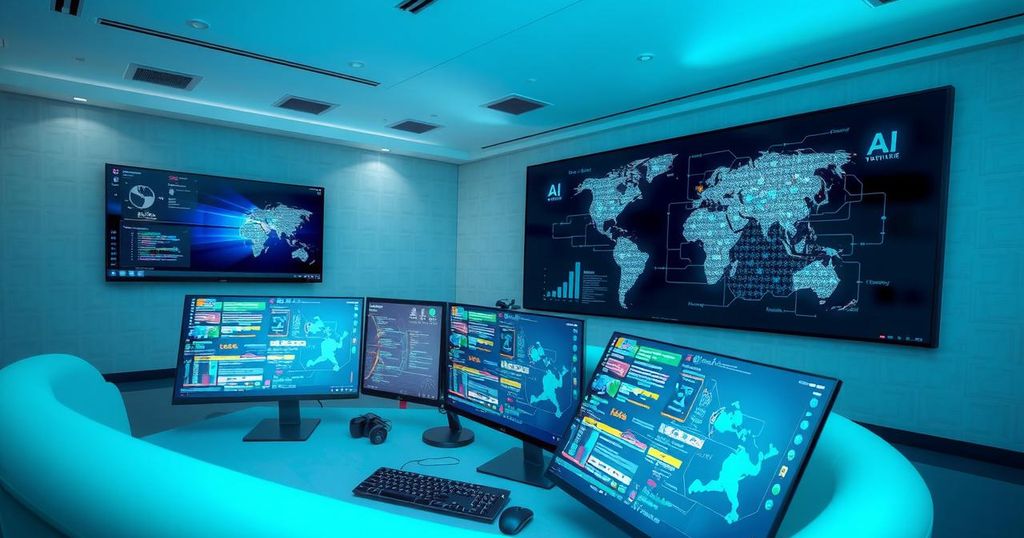AI’s Growing Influence on Tech Support Jobs: What Does the Future Hold?
AI is set to transform tech support roles, with companies like Palo Alto Networks reducing human staff and shifting to generative AI solutions. Despite this, employee preferences still lean heavily toward human interactions for tech issues. Future job demand for IT support specialists remains strong, even as roles evolve due to automation.
AI has been making strides in replacing human roles, and it seems like the tech support desk could be next on the chopping block. We see customer-facing chatbots springing to life in everyday scenarios—think Walmart employees getting help from AI on the sales floor or Tractor Supply’s reps donning wearable AI technology. The IT support desk, relied upon by countless workers facing tech issues, is now facing this same potential upheaval.
Estimates suggest that by 2027, generative AI might churn out more IT support documentation than humans, according to Chris Matchett, a senior director analyst at Gartner Consulting. This is part of a broader strategy favoring self-service consumer experiences—where less emphasis is placed on human support. The shift is being nudged along by automated systems, intuitive portals, and a solid knowledge base. Matchett emphasized that “AI can help with these.”
Some big players in the tech industry are already racing ahead—like Palo Alto Networks. CEO Nikesh Arora mentioned in a recent earnings call that the cybersecurity company had trimmed its IT support team by nearly half, projecting an overall reduction of 80% thanks to AI shouldering simple tech queries. So, while the corporate workforce is around 15,000, just 300 employees, that’s about 2%, used to be dedicated to solving tech tickets, is now facing a big reshuffle.
“We think that can go down 80% because we’ve been able to automate a lot of the tasks,” Arora explained. With tasks becoming repetitive and, dare I say, boring, the expectation is that automation will replace many workers—not totally, but significantly.
IT support roles do hold a unique place in the workplace ecosystem. Employees often depend on them to untangle annoying tech snafus that can bring productivity to a halt. These jobs are frequently leaping-off points for many tech careers as well. But while it seems likely that the headcount will drop with automation, Matchett cautioned that many AI initiatives will struggle: by 2027, about half will likely be abandoned due to financial concerns or unforeseen risks.
As of now, employees still overwhelmingly prefer human contact when reaching out for support. A recent Gartner survey of over 5,000 digital workers revealed that chatbots or AI agents for tech issues ranked last on their preference list, with fewer than 10% opting for AI methods. Methods with human interaction, like phone and live chat, still reign supreme, as Matchett pointed out: “success hinges on the humans that will always be involved.”
Taryn Dawson, senior manager at Palo Alto Networks, highlighted the big picture: the move toward an AI-enhanced workplace can lead to fewer staff while boosting efficiency. She noted, “More and more, we’re leveraging generative AI techniques both in our products and operations to make it easier for our customers and employees to self-service their needs.” With AI speeding up documentation searches significantly, we aren’t stepping away from human input; it’s about enhancing it.
Seth Robinson from CompTIA weighed in, noting that automating tasks and allowing for self-service options are still top priorities in IT. Despite AI’s potential benefits, hurdles remain, especially when implementing tech support automation. AI often resolves solutions based on probabilities, which risks delivering incorrect answers. The improved technology is reducing errors, but they still exist.
Furthermore, human error is more palatable; we accept that it’s part of the problem-solving dance. “There is a fine line between delivering improved results for the customer and causing frustration,” Robinson noted, emphasizing that with automation, if things go wrong, frustration can quickly escalate.
AI is reshaping IT support roles, creating a shift in workflow while still keeping demand alive. Recent job market trends, as highlighted in CompTIA’s Tech Jobs Report, show that job postings for IT support specialists remain relatively stable, indicating that while the role is changing, it isn’t vanishing. “Mileage may vary from company to company,” Robinson said, “but the aggregate picture suggests strong demand for this critical role for the foreseeable future.”
In conclusion, the advancement of AI is clearly carving out new paths for tech support roles. While companies like Palo Alto Networks are rapidly adopting these technologies, it’s evident that both AI and human interaction will continue to play pivotal roles in the IT ecosystem. The balance is delicate—automation can enhance efficiency but risks overstepping the critical need for human connection in problem-solving. For now, there’s still a strong demand for IT support specialists, despite technological evolutions on the horizon.
Original Source: www.cnbc.com




